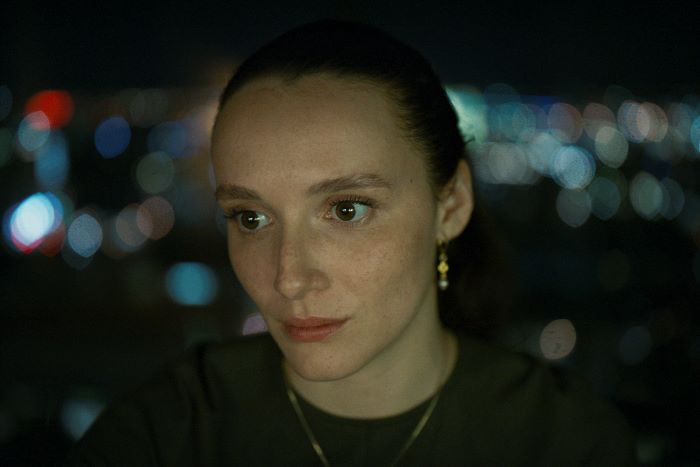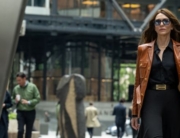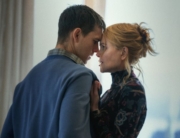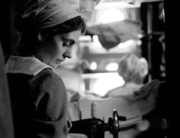It takes a while in Red Rooms for the viewer to see much red, let alone the eponymous rooms. Instead, much of the action centers on an incredibly white courtroom where a skinny bearded and balding man (Maxwell McCabe-Lokos) sits in handcuffs behind glass. He is accused of viciously murdering three teenage girls and posting graphic videos of the killings on the dark web, in what is called a red room. The details of the crimes, which the prosecuting lawyer recites, are hyperbolically horrific. She aims to prove that such rooms on the dark web are the product of an increase in supply and demand: There are people out there who want to see these crimes, and are willing to pay for it. The courtroom, except for the sobs of a bereaved mother, remains quiet.
Two women sit in the section of the room dedicated to those who wish to attend the trial, but are not connected to it. Wide-eyed, diminutive Clémentine (Laurie Babin) believes the killer is innocent. She has, in fact, fallen in love with him, much like a groupie, and states that it was the look in his eyes that convinced her that he must be innocent. She has taken the bus from her hometown to Montreal just so that she can be there.
The other, Kelly-Anne (Juliette Gariépy), keeps her reasons to herself. She leads a rigorous, solitary life: modeling, gambling online, sitting in front of her computer monitors sinking deep into unlikely parts of the internet. She wakes up early and sleeps outside so that she is guaranteed a seat at the trial. This is a world in which sleek surfaces conceal much, and through the slow zooms on Kelly-Anne’s face, the look in her eyes, the eerie soundscape that intensifies, it is clear that her interest in the killer is of a different nature. While her motives are never revealed or explained per se. As the film begins, she gradually starts losing her grip, her actions become more erratic, and her sleek surface does not end up hiding quite as much as she wants it to.
Much has been written about the true crime boom, and a character obsessed with a serial killer who might have something a little weird going on with herself is not unheard of in today’s cinemascape. Still, Red Rooms impresses with its eerie quiet, cinematography that brings to life suspiciously clean interiors, strong acting, and its focus on the darkest aspects of the internet. (Gariépy is quite impressive in her ability to suggest motives we can only guess.) It also manages to be pretty horrifying without really showing violence. The most arresting aspect of the movie is probably the way in which two people can see very different things in an image.
Still, the movie, though intriguing, is not fully satisfying. Certainly, there are some tactical errors on the director’s part—overwrought music and an extended, tense scene in which the audience is forced to watch something ultimately pretty boring (an online bidding war)—but none of these things would hamper the film too much on their own.
One obvious takeaway from Kiyoshi Kurosawa’s Cure, David Fincher’s Zodiac (to name two that involve killers), or really any horror or thriller film that is taken seriously as a work of art is the way in which ideas are embedded in, or provoked by, the narrative rather than neatly stated in the dialogue. Many recent films have started to feel quite literal, with obvious symbols, obvious dialogue, all making the ideas transparent. Red Rooms is by no means the greatest offender in this camp. Much of it, as stated earlier, is wrought with skill. And yet, the action still is too tightly structured around the given societal problem for the movie to really carry the viewer away. Consequently, it comes across more like an exercise than anything else.
Graham Greene famously praised the “low cunning” of thrillers, stating that “If you excite your audience first, then you can put over what you will of horror, suffering, truth.” “Low cunning” is a term I’ve always liked, and it might be just what’s missing from Red Rooms.

















Leave A Comment